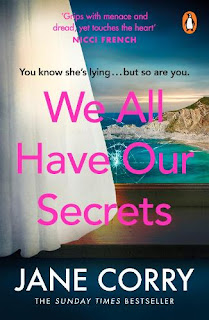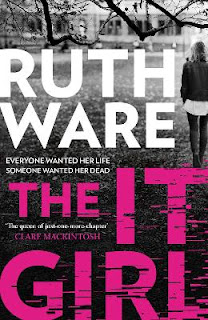Meet Isabel Ashdown author of 33 Women
Today we're so pleased to talk to Isabel Ashdown, author of eight novels, the latest of which is the thriller 33 Women. It's hot off the press with a publish date of 26th November 2020 by Trapeze!
Copies are available in all good bookshops and we feature it in our Thriller Women list at bookshop.org. NB: if you books through this link we may earn a commission from bookshop.org, whose fees support independent bookshops.
Here's the enticing cover:
TW: Congratulations on the launch of 33 Women. What inspired you to write it?
IA: I’ve always been fascinated with the idea of closed community living, perhaps because I know it would be hard for me, a confirmed introverted creative! How would it feel to give up ‘normal’ life and live alongside so many others? Wouldn’t you miss the outside world – your family, friends and freedoms? And, at a darker level, at what point does a commune become a cult? When do the admirable privations of one lifestyle slide into the coercive control of the other? And what happens when a crime occurs inside a closed community – both to the people inside, and to those beyond the wall, seeking long buried answers?
TW: What is it that attracted you to writing thrillers?
IA:My first four novels were categorised as literary/commercial fiction, and when I look back on their development, I guess I was quietly edging towards the thriller, with Flight being very much a family mystery. In a way, I’m less wedded to the idea of writing a ‘thriller’ than I am to exploring the dynamics of family and relationships whatever the genre. For me, the thriller means so much more, emotionally and psychologically, when it mines the depths of the human spirit and forensically examines a character’s response under pressure.
TW: 33 Women centres on sisterly relationships. Why is this a topic that interests you?
IA: I have a sister (the children’s writer/illustrator Rebecca Ashdown) and we’ve always been close. But growing up, we didn’t really have many sister role models; neither of our parents had sisters, our only grandmother had just brothers, and most of my close friends were sisterless too. I think my sister and I felt lucky to have each other. I’m happy to say I’ve always had close female friends, who I love and value like sisters. In Little Sister I explored sisters at war. In 33 Women I’m looking at both familial sisters and sisterhood as a broader concept in the setting of a fiercely loyal, closed community where men are excluded. Surely, such conditions can only make for enticing fiction! I’d like to add, I also have a lovely brother, and I’m a big fan of the good men of the world.
TW: What are your tips for writing murder thrillers?
IA: The murder is less important or interesting to me than the characters and relationships that surround it. Without a rich, complex, believable cast, a murder is just a headline, a string of events. Take care of your characters; they’re the ones who’ll breathe life into the mystery.
TW: What research did you do for 33 Women?
IA: I did a lot of research into women-centred communes and projects throughout history, as well as reading papers and watching features on modern refuge centres and the lives of the women who are driven to ‘disappear’ behind their walls. I also went back through the BBC archives to watch a docuseries about the Poor Clares convent in Arundel, where my novel is set, and include a cameo chapter in which they are visited in the course of an investigation. Whilst the convent community is religious rather than secular, watching this reality archive helped me to develop a sense of place and community within my fictional Two Cross Farm, where my 33 women live from 1976 to present day. I also visited Arundel, a beautiful olde town, nestled at the foot of a medieval castle in West Sussex, near where I live.
TW: 33 Women is your eighth book. Can you tell us please about your initial route to becoming a published author.
It all started in my mid-thirties, when I gave up my career in marketing to enrol as a degree student in English and Creative Writing (having missed out on higher education in my earlier life). I began writing my debut Glasshopper at this time, and when an early extract of it won the Mail on Sunday Novel Competition I quickly signed with an agent and publisher and my writing career began.
I make it sound easy, don’t I? Sorry, it’s not really. Prior to this success I’d worked slavishly, rising before the kids woke to polish the manuscript, working late into the night and sending out submissions for the many, many competitions I did not win. I thought about quitting; I dusted myself off; I carried on. My message to new writers is this: being good at writing is not enough. You also need to engage your resilience, and work hard to get your precious words out into the world. AND when it is published, you need to be prepared to do it all again. But if you love writing and can’t imagine doing anything else, it’s worth every drop of blood, sweat and tears! I love it; I guess that’s why I’m on Book 8.
TW: As a writer how do you manage to keep each book fresh yet still within the genre that your readers love?
IA: I only ever write about themes, characters and places that excite me. I plot, but loosely enough to allow the story to take unexpected turns, and I try to give myself enough time away from the desk that I’m keen to get back to it each day. Walking is my thinking time.
TW: What's next for you?
IA: I’ve just signed a new two-book deal with Trapeze/Orion and I’m halfway through writing the first draft of my 2021 book. It’s an exciting new project – but that’s all you’re getting!
Quick fire questions:
TW: Ebook or paperback?
IA: Paperback (ebook on the train!)
TW: As a writer how do you manage to keep each book fresh yet still within the genre that your readers love?
IA: I only ever write about themes, characters and places that excite me. I plot, but loosely enough to allow the story to take unexpected turns, and I try to give myself enough time away from the desk that I’m keen to get back to it each day. Walking is my thinking time.
TW: What's next for you?
IA: I’ve just signed a new two-book deal with Trapeze/Orion and I’m halfway through writing the first draft of my 2021 book. It’s an exciting new project – but that’s all you’re getting!
Quick fire questions:
TW: Ebook or paperback?
IA: Paperback (ebook on the train!)
TW: Halloween or Bonfire Night?
IA: Bonfire Night (though Leonard the Dachshund disagrees)
TW: Tom Clancy or Lee Child?
IA: Lee Child
TW: Brisk November walks or bingeing boxsets indoors?
IA: Both. Add a glass of sloe gin, a roaring fire and a box of chocolate brazils and I’m in heaven.
Thanks Isabel!
More about 33 Women
When sisters Celine and Pip get a call telling them their reclusive mother has died, the women are reunited at her riverside home in Arundel to pick up the pieces. But someone is missing - their middle sister, Vanessa, brutally murdered years ago and the victim of an unsolved case.
As the sisters confront ghosts from the past, the discovery of another body in similar circumstances throws new light on Vanessa's death. Could there be more to her case than the police first thought? And what do the mysterious residents of Two Cross Farm, the neighbouring women's commune, have to do with it? What secrets are lurking behind their locked gates? And what is the significance of the number 33?




Comments
Post a Comment